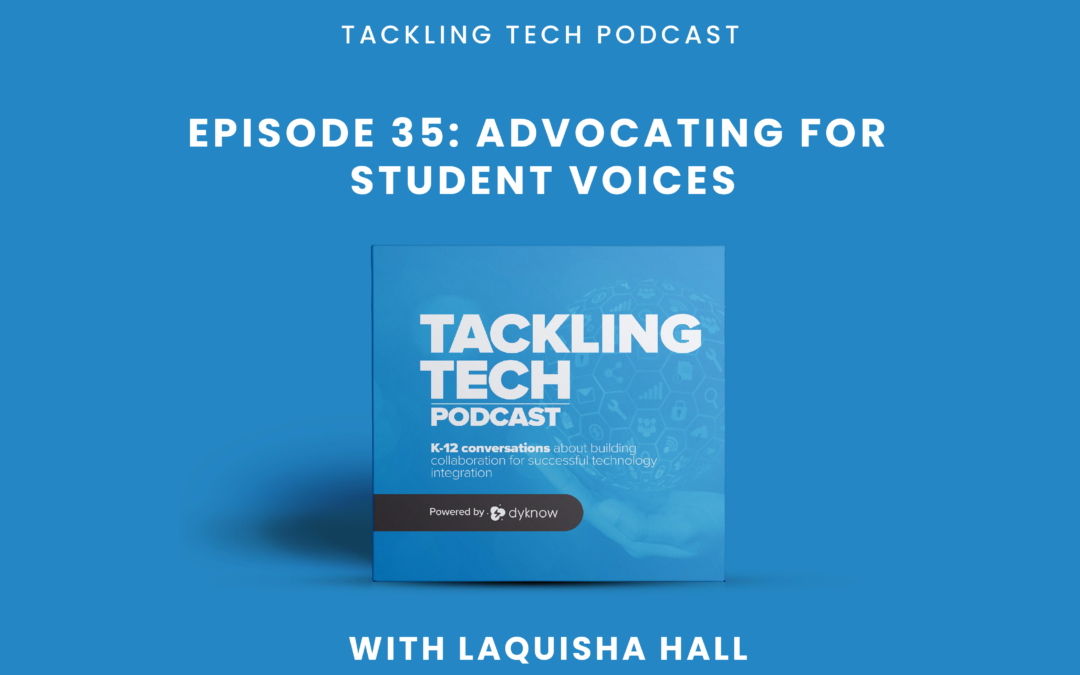On this episode of Tackling Tech Podcast, powered by Dyknow, Brett McGrath speaks with LaQuisha Hall, the 2018 Baltimore City Schools Teacher of the Year, Founder of Queendom T.E.A. and the SheRose Awards, among many other accomplishments. LaQuisha advocates for student voices and Social Emotional Learning and suggests that the first step is opening up to your students as a human being with a past and not just an authority figure.
Listen to Episode 35:
Available wherever you listen to podcasts:
Don’t have time to listen to the episode? Here’s a peek at what’s inside…
LaQuisha’s background in K-12 education
This is LaQuisha’s 18th year as a teacher at Baltimore City School District where she has worked since she graduated from college. Throughout her nearly two decades as a teacher, she has discovered many needs of both teachers and students which has prompted her to take on a lot of opportunities to support these needs. In doing so, she has created virtual opportunities for teachers to connect around the world and for students to receive support on a social and emotional level.
The Evolution of Queendom T.E.A.
In 2018, LaQuisha founded Queendom T.E.A., a girls mentor program in her school. This program came from her realization that a lot of her female students were staying after school claiming that they wanted to help wash boards and clean up the classroom, but in reality they just wanted to talk with LaQuisha about things that were going on in their lives. So, LaQuisha created a program where they could all do this in a structured setting.
Overcoming the growing gap between teachers and students
LaQuisha truly believes in the power of student-teacher relationships, but this was an important topic for her before it really became a hot topic during this time of remote learning.
By sharing her story with students, they had the opportunity to see her as human and not just the teacher at the front of the room. They no longer just look at her as “Mrs. Hall the teacher” but they understand that Mrs. Hall cares. She is confident that her students know that if they are having any sort of issues, they can go to her and be honest with her to receive support. LaQuisha has learned that being authentic with your story, yourself, and being vulnerable with your students can allow doors to open that you could never even imagine.
Social-emotional learning before and after COVID-19
Before the onset of remote learning due to COVID-19, LaQuisha saw a lot of people talking about social-emotional learning and she is glad that this topic became popular at the time that it did because students have needed additional SEL to get through COVID-19. She expressed that throughout her time as a teacher she has consistently practiced SEL tactics but didn’t necessarily know that was called social-emotional learning when she was doing it.
“Any time you put the emotional and social needs of students and children in front of them and support them with that, you are practicing SEL.”
– LaQuisha Hall
LaQuisha’s only critique of SEL right now is that teachers are focused on practicing so much of the emotional part by doing check ins and making sure that students’ emotional needs are met. She urges teahers to remember that they can’t neglect the emotional part of SEL. Students need to be able to articulate the emotional part and then apply it to social interactions and the emotions that come with them.
How can teachers get started with advocating for student voice?
LaQuisha recommends that teachers start advocating for choice at the beginning of the school year to ensure there is consistency for students. She recommends to start the school year with being vulnerable and talk with students about why you are encouraging them to speak and why they need to use these skills.
1. Promote Leadership: She always tells her students that they are leaders and they have their own autonomy. She just sees herself as a guide to help them become educated and then truly become leaders.
2. Encourage Student Voice: The most important part of getting started with promoting student voice is ensuring they know they have a voice. When the teacher’s voice is the is the only voice that has traditionally existed in the classroom, students need to feel comfortable expressing their own voices.
3. Practice Restorative Circles: Create a space to give students an opportunity to sit together and talk about something that is important to them. You’ll be surprised about what students will share and why they will feel a need to share certain things in this environment.
“We need to show students that their authentic selves matter and that their voices matter. When you do that, it changes what the classroom culture and climate looks like. Your students value you because they know you value them.”
– LaQuisha Hall
Advice for teachers during this time
LaQuisha is very passionate about helping other educators achieve things that she has acheived with her students. She explained that as an educator, we’re often asked to analyze data, to grade papers and to understand what those grades mean. Educators are constantly asked to evaluate how students are doing, but she encourages educators to reflect on their own performance and make note of how they are doing.
She asks educators to write a lesson plan for themsleves and designate a certain amount of unbothered time where they can indulge in something that brings them joy – whatever it may be – so that they can get some time for themselves. Educators have to be filled, or they won’t be able to pour. Educators need to take time to fill up with things that make them happy so that they can help give that energy to their students.





